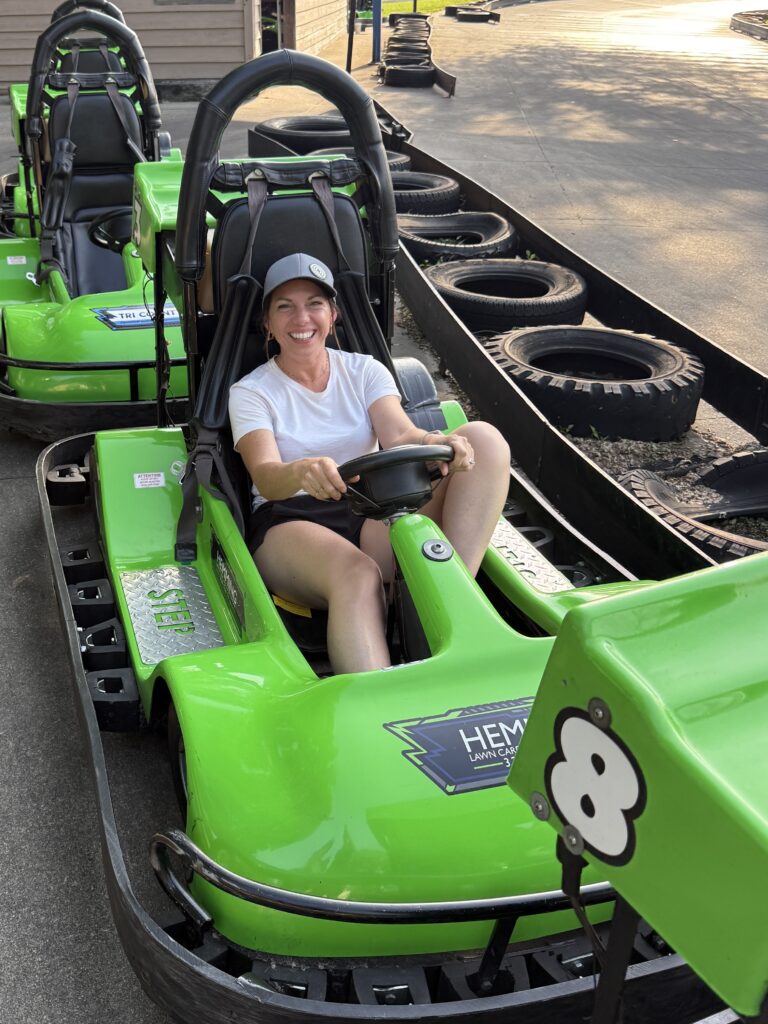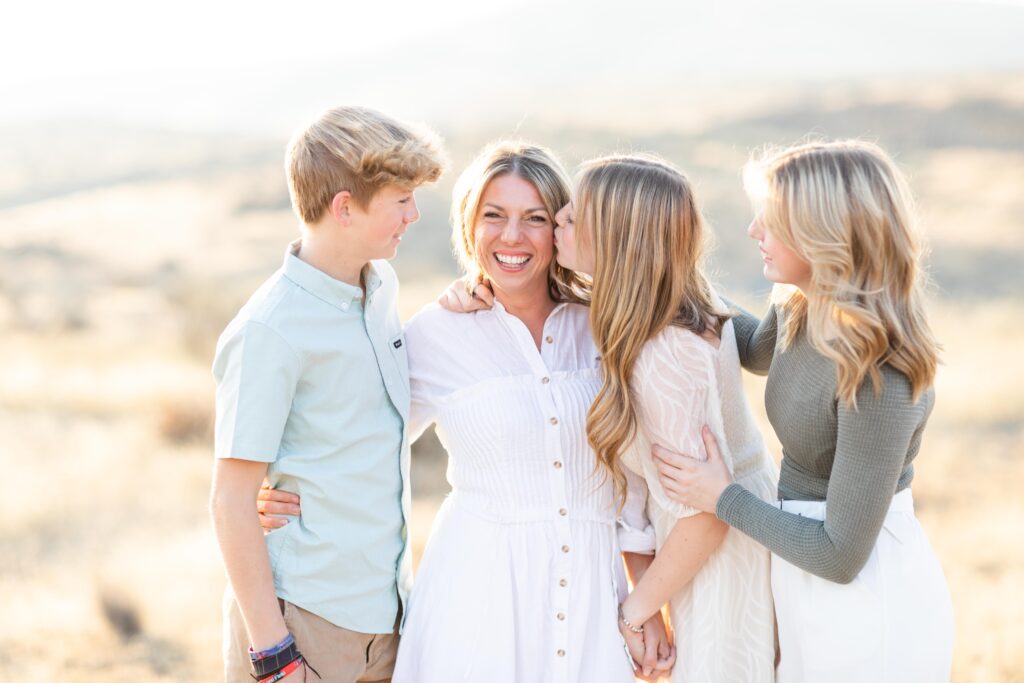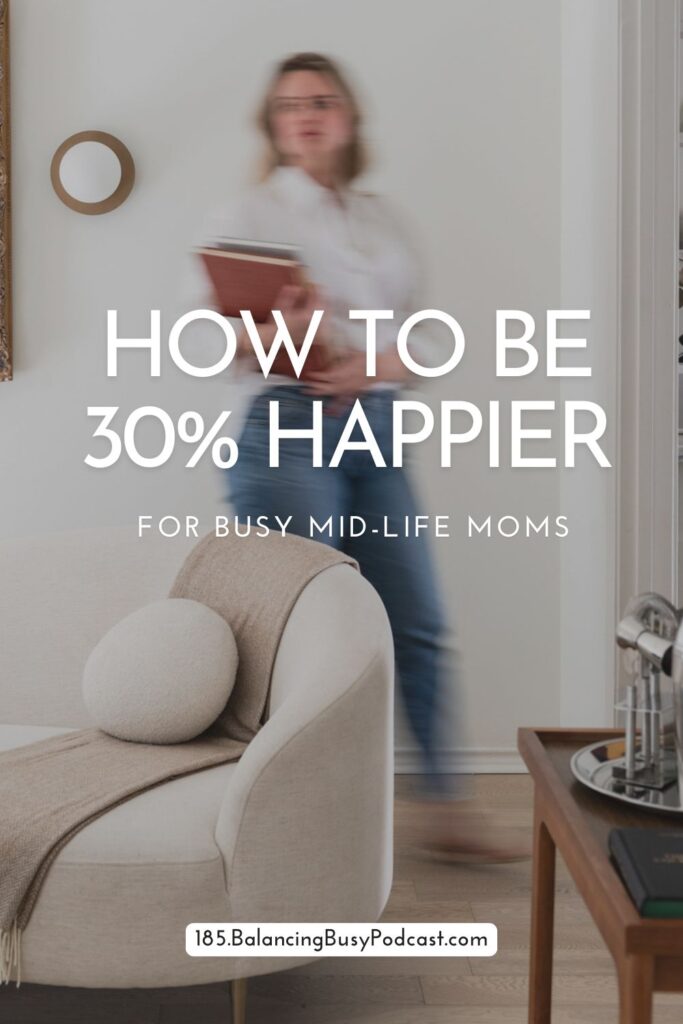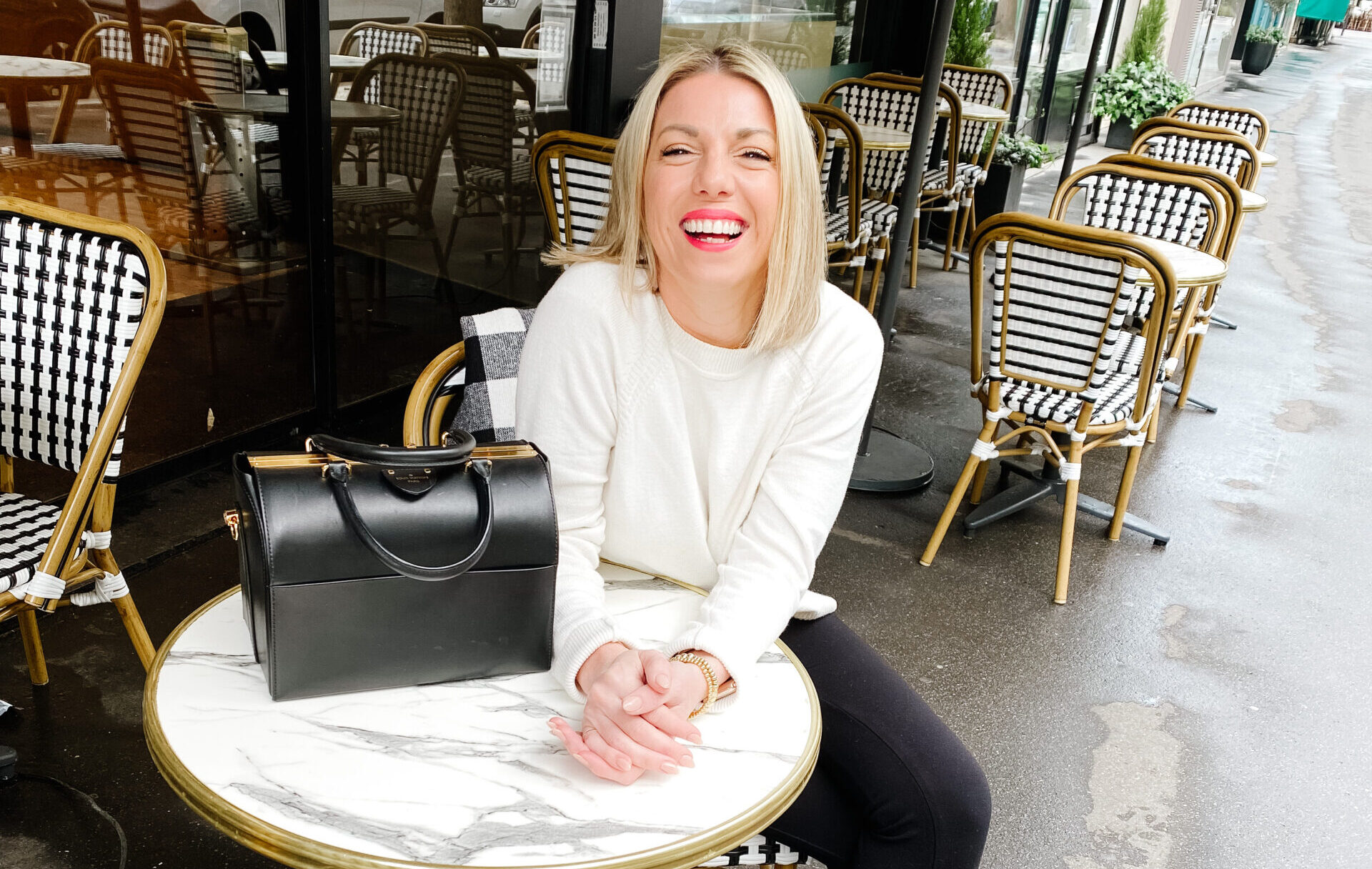It was a random weekday over the summer, and I had this experience, and the thing is, I can’t stop thinking about it and the implications that it has. So I wanna share it with you and I wanna unpack it together and figure out why the heck did I do this? And second, how can we all learn from. So over the summer I was in Minnesota with my son and my husband.
So our son does competitive wake surfing, which means that we travel all over so that he can compete. So we’re in Minnesota for a competition, which by the way, if you happen to live in Minnesota, your state is stunning. Now I know I was there in. When was I there? June? July. June, I think.
And oh my gosh, it was so gorgeous. I had no idea it was beautiful. So anyways, that’s a different thing, but wow. Beautiful, beautiful state. Okay, so we’re in Minnesota. We go and we check out the lake where the competition’s gonna be. We’re heading back to our hotel. We don’t have anything to do that night.
And we see one of those family fun centers. You know, the ones they have like. Go-karts and miniature golf and things like that. So we stop and we decide that we’re gonna go go-karting. So we buy our tickets, we get onto the track. It’s my son, my husband and I, we’re the only ones on the track. They let us loose and off we go around this track and I forgot how much fun this is, and I was just having the best time, like loving the wind in my face trying to, you know, rip around the corners.
And I had this overwhelming desire to just smile, but I mean like one of those really goofy, ridiculous, full on teeth bugs could get in there. I don’t know. But just I wanted to just like liberate my joy and I resisted. I held back and I held back because there’s teenage employees that are strategically positioned to.
You know, make sure that they help. If I somehow get myself side walled and turned around and they get me back facing the right direction on the track, and I didn’t want to look embarrassing, I didn’t wanna embarrass them. And then I realized what had just happened. I realized that I was holding back my joy, my happiness for what?
Like what was the reason? And I realized. It wasn’t a good one, and so I let my smile just full it out and, and I did. I felt so dorky as I’m like going around the corner and there’s the, you know, teenager perched waiting and there’s me full giant grin, big teeth showing, just having a ball
And the thing is, I’ve thought about this over and over and over since it happened because I don’t want to stifle my happiness, my joy, and I think that this is something as adults that we do, and I wanna figure out why do we do it. And how do we fix it?
Now, you may have heard this research before. I know I’ve read it in books before, but there’s all this research about how kids smile something around 400 times a day. I don’t know who is there, like tick, tick, tick. Like they’re the ones that are like, oh, add a little tally. Little, little Jane just smiled again.
And then they see that adults. Smile on average 20 times a day, and they even found that the happy adults, they managed to smile at least double that 20. They smile like 40 to 50 times a day. But even the 40 to 50 times a day is such a huge drop off from the childhood joy levels, right? I mean 400 times a day for your average kid.
And then you get to adulthood and we’re, if we’re considered happy, we’re only 10% of that. So today I wanna talk about why do we dim our joy? Why smiling, even forced, actually makes us feel better. And how you can be 30% happier every single day using small science-backed strategies. Plus how this all ties into living a truly balanced life, one that feels good in every area because balance is about feeling good.
And when we’re smiling, that seems to be proof to me that we’re feeling good.
. And another thing I wanna throw in here that I just think is really fascinating and interesting to think about is this whole theory frederickson’s broaden and build theory.
Okay, I think I said that right. And it’s how they’ve shown that experiencing positive emotions helps you think broader and build long-term resilience. So if I’m stifling. My happiness, my positive emotions, then I’m literally hurting my ability to be resilient long term. I thought that was so interesting to think about.
Okay, so now let’s shift. Let’s talk about how do we actually increase. Boost our happiness, and there really are proven strategies. What I love is that there is actually so much research, so much science that has gone into studying happiness. What makes people happy? How can they increase happiness? So we’re gonna talk about four very practical ways that are simple because obviously this is balancing busy.
Everybody’s busy. We need things to be simple. So here are four simple, practical ways that you can boost your happiness, that literally could boost your happiness. 30%. So if I said, on a scale of one to 10, how happy do you feel? And you were like, eh, maybe a four. And then I can say, well, I can bump that up to a seven.
That’s amazing. And these are easy. Okay, so let’s get into ’em. Number one is to smile. What’s really, really fascinating is it doesn’t even have to be because you feel like smiling. Like it doesn’t have to be because something great happened. You can fake it and you can still get the incredible benefits of smiling even if you’re not feeling it.
That is just amazing to me. So researchers show that even forced smiles reduce stress and increase positivity, but. I don’t even know if we have to go there because I’m realizing here I’m catching myself wanting to smile and resisting holding back. What? What is that? So. Just starting to train ourselves and think about every time there’s an opportunity to smile.
Every time there’s something that’s, you know, kind of funny, that’s fun, that’s silly, that makes you happy, that you let yourself actually smile. You use those muscles in your face and you turn that smile upward and you let those teeth be seen by the world. We can even try like 20 seconds of a goofy grin in the mirror.
Maybe you’re getting ready to go into. Some situation that you’re not feeling great about. And right before you get outta the car, you flip down the visor, you look in the mirror, and you just let yourself make silly, ridiculous faces and goofy grins for 20 seconds, and then go in and just see how much that helps.
Or maybe you’re about to show up and you really wanna show up as your best self and really positive. Give it a try. See what happens. Okay, number two is. Micro joys and then just savoring. So there’s all of these studies. Berkeley’s done ’em. There’s just tons of research that shows five to 10 minutes of joyful micro acts, daily boosts wellbeing.
So how do we be more intentional about. Choosing joy. This can be anything from really simple like little mini adventures that we schedule, a sunset walk or bubble play with your kids, or just things that you’re like, these just make me happy. It can also be, and I’ve said this before because this is something that I did years ago.
I actually, in one of my New Year’s resolution lists, years and years ago, I was like, one of my resolutions was to laugh more. That was the resolution. So then I was like, okay, well how do I make a plan for this? How do I systemize this? And so part of it was. Choosing that when I was gonna watch a show or a movie, I looked for funny movies.
If we were gonna sit down and watch something, maybe I would suggest a comedy special. I was purposefully choosing things that would make me laugh, and it really did make such a difference. So you think about the content that you’re consuming, whether that is the media. So you know, movies, shows, books. Are you looking for funny and are there the things that are like truly drag you down?
And could you cut those out for a while? I am totally looking at you. News. You are a buzzkill. Okay, number three, social connections. I know we all know this. We’ve talked about it every episode. Interview I ever do. Whatever we are talking about, they always talk about whatever it is. Whether it was like learning financial literacy or anxiety or, I can’t even think of all the topics, but every topic we ever talk about, the person that I’m interviewing will somewhere inevitably say that it will be better if you have community.
Even when we were talking about symptoms of menopause, and it was like, by the way, they’ve shown that. Your perimenopause and menopausal symptoms actually are reduced when you talk about it with other women. I mean, it’s just crazy. So social connection should be so obvious, but obviously this. Also makes us happier.
So the World Happiness Report finds that social ties predict life satisfaction really almost more than anything else. So that means that we need to take the first step. We need to plan weekly calls. We need to invite a friend for a walk or do a family game night, or suggest that. You go do something outside together instead of your norm.
I was just thinking today, oh, we should do dinner as a picnic. You know, there’s a little bit of sun left. We should just go out and have a picnic dinner instead of just sitting at the table. It’s just a little something a little different and it creates a little stronger connection. It’s a little more fun.
So just thinking about how can you create more social connections that lift you up, and if you can somehow connect that with like something funny. I mean, you are really winning. Okay, number four, this is something I love to talk about. I’m never gonna stop gratitude practice. So when we write down what we’re grateful for, it boosts our wellbeing for months.
I mean, the research is so cool on this. You can write down. What you are feeling grateful for and the effects last way after you’ve written ’em down, like up to months after that is incredible. I can’t think of an easier, more obvious thing to do, to feel happier, to feel more content, to be able to see and recognize more of the tender mercies and the goodness that are in your life.
So. For me, it’s simple. I write three things every single day that I’m grateful for. I literally write, I am grateful, and then I write out the thing. I am grateful, and then I write out the thing. I am grateful, and then I write out the thing. It’s really simple. It’s quick. I have one specific little journal that’s just for that, and I do it in the morning.
You could do it at night. The point is just to do it. You could do it on your phone. You can do it in an actual little notebook wherever you need to. The power is in. Making this practice of looking for the good and then documenting it and then writing it out, and the power that that has in our overall wellbeing, in our overall happiness and contentment is just profound.
So. I wanna finish this off by saying, okay, but how does happiness equal balance? How does it all tie in? And this is why I think that this episode is so relevant to a podcast called Balancing Busy. Because balance cannot just be a checklist. It can’t be about, if I get enough things done, then I feel balanced.
It’s how you feel in every moment. That is true balance. And so when we’re thinking about that, when we’re thinking about our life, it’s about looking at all the areas of your life and saying, how do I make each one feel good, feel strong? I feel empowered in all the areas of my life. And when you’re laughing and smiling and connecting, you’re actively creating balance.
So my go-kart moment over the summer helped me realize that. I might actually be stifling joy and that that joy could be holding back more happiness and contentment and balance that I could be feeling. And I don’t think that that’s a just me problem. I think we as women, maybe sometimes allow ourselves to play a little bit smaller, to be a little bit less, to let our light be just a little bit softer, because I don’t know why.
I mean, we could get into a whole conversation of, you know. The feminine species and why do we do this? But the point is I’m interested in not doing it. That’s what I’m interested in. I want to choose joy, to choose to let my light shine. To choose to smile radiantly, even if it’s embarrassing for.
Teenagers around me. That’s what I want. So there you go. That is this episode. So what are our takeaways today? Our takeaways are smile more. Even if you have to fake it, it will still work for you. Number two, find micro joys. Curate them, create them, make them happen, and do it daily. Number three, social connections are always going to help boost happiness.
And number four, gratitude is one of the most powerful ways to increase your happiness. And when you combine all of those, you can increase your happiness. Bare minimum, 30% if not much, much more much. Okay. I’m Leah Remay. This is the Balancing Busy Podcast where I help you do less. But have more impact.
That is what we are all about. We are about loving the life that we’re living. I cannot wait to see you next week. I am your balanced bestie, and I will keep bringing you strategies, ideas, tips, systems, all of the good things so that we can live our very best lives.
Hide Transcript




you said: